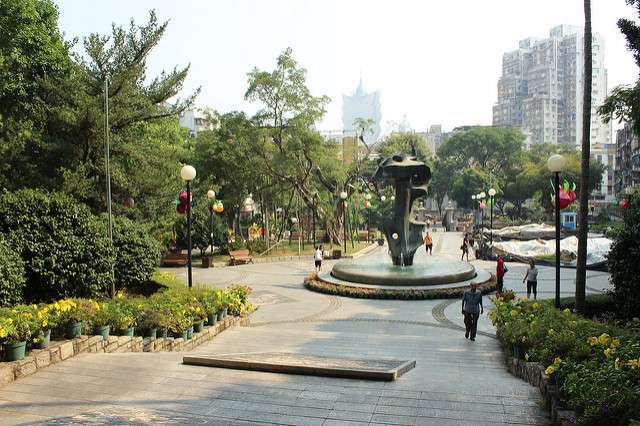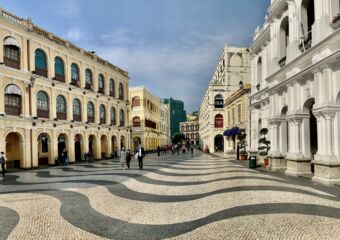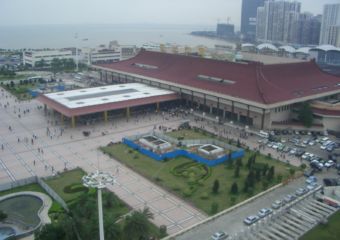Four years ago, Macau experienced the fiercest typhoon to hit the territory since 1968. Typhoon Hato also lashed Hong Kong and Zhuhai but neither city suffered damage close to the scale of that visited on Macau.
The Hong Kong meteorological observatory raised the no. 8 typhoon signal–a storm category that suspends public transport, closes schools and offices and tells residents to stay indoors–before 6:00am on the day Hato made landfall. Zhuhai also hoisted a similar red storm warning at 6:00am, according to China’s official Xinhua news agency. In Macau, a less severe storm signal remained in force for a further three hours. This delay exposed crucial failings in the emergency services and infrastructure and was widely considered to be behind the tragedy of lost life and great public disruption.
“There was no water, no electricity, the telephone was not working and the radio station was not broadcasting any news” reported João Manuel Ambrósio, the vice president of Macau Red Cross. “It was more than 12 hours before we could properly assess the situation and then we became aware that it was really very serious.”
For both newcomers to Macau and for those who have lived here for years, the typhoon caught us all off guard. With the benefit of hindsight here are some typhoon tips–for tenants and owners alike–to be better prepared for future typhoons.
Preparation
- Macau’s weather forecast services have become much more advanced since Hato. The Meteorological and Geophysical Bureau (referred to as SMG) has an excellent mobile phone app to download which is highly recommended. It’s very informative, with regular updates, clear visuals in the form of charts and maps–in your choice of English, Chinese or Portuguese
- Consider taking out Home Contents insurance. Important to check the small print that cover is provided for damage caused by flooding and typhoon 3 and above. We’ve been greatly surprised that not one of our tenants had insured their personal possessions when Hato hit us and several lost many thousands of dollars of electronic equipment, TV, sound systems, laptops, and furnishings, such as sofas and bed mattresses
- Keep several battery run torches (and candles and matches) easy to hand in case of a power cut
- Charge your telephone and any backup batteries and laptop so you have sufficient power should electricity be suspended
- Keep rolls of packing tape (take care which type–not the stuff that is very difficult to remove afterward) to tape up your windows in a diagonal cross ahead of any future typhoons
- Fill some buckets with water for emergency supplies for cooking, washing, and even drinking in case the water supply is suspended
- Keep some basic food items handy–tinned and dried goods, bottles of water
- Have some old towels and a good mop to hand should your windows start letting in water
- Remove plant pots and furniture from terraces and balconies
- Ensure that your windows are firmly secured; if you have handles that don’t close properly, tape them up. Some argue that keeping a window open at the front and the back of your home helps a through-wind and stops the pressure from building up, causing windows to break. But honestly, Typhoon Hato’s wind gusts were just too strong for this–open windows were easily ripped off their hinges.
- If you have a car that’s parked in an underground car park that is susceptible to flooding–you may consider moving it to a hotel or residential car park that has above-ground parking. The Broadway Hotel and the One Central car parks are some examples. The hourly rate will be expensive for a day or so, but it will be a small cost compared to losing your whole car to flooding. Hundreds of cars were lost in Typhoon Hato and the poor owners not only lost their mode of transport but if their car was still under a mortgage they of course still had to continue paying their installments
During the typhoon
- Don’t use the lifts in your building in case of sudden power suspension
- If you feel it necessary, and depending on the damage your home has sustained, stay in the lift lobby for security, or take the fire escape stairs to the ground floor lobby
- Take photographs and video of any damage for insurance and other reporting purposes
- Clear out all personal effects and valuables and remove curtains from rooms that have broken windows
- Try as best you can to mop up excess water from the floor, especially if you have wooden or engineered wood floors; water will quickly seep underneath which in turn will start the floor “lifting”
- If bedroom windows are broken move the bed mattress to a dry place elsewhere in your home; most bedframes can survive getting wet for a short while but mattresses cannot and they are also a high-cost item if they have to be replaced
- Plan what you may need from your refrigerator and freezer, and then once these are taken out, keep the doors firmly closed. If there’s a power cut, you want to keep your chilled and frozen items for as long as possible
Post typhoon
- Tenants, inform your real estate agent immediately of any damage so that they, in turn, can inform your landlord
- If living in a relatively new property with a decent property management company–register your apartment damage with them. After Hato, One Oasis’ management was quite quick to respond by boarding up the many broken windows
- If you have insurance, inform your insurance broker
- Keep an eye on social media; in Macau, the government announced financial assistance to help cover repairs expenses
For any queries on these tips on Macau’s real estate, Suzanne Watkinson welcomes you to contact her
Ambiente Properties 2F Comercial Infante Building, 17a Rua do Dr. Pedro Jose Lobo, Macau, +853 6622 8541, www.ambiente.mo, [email protected]


































